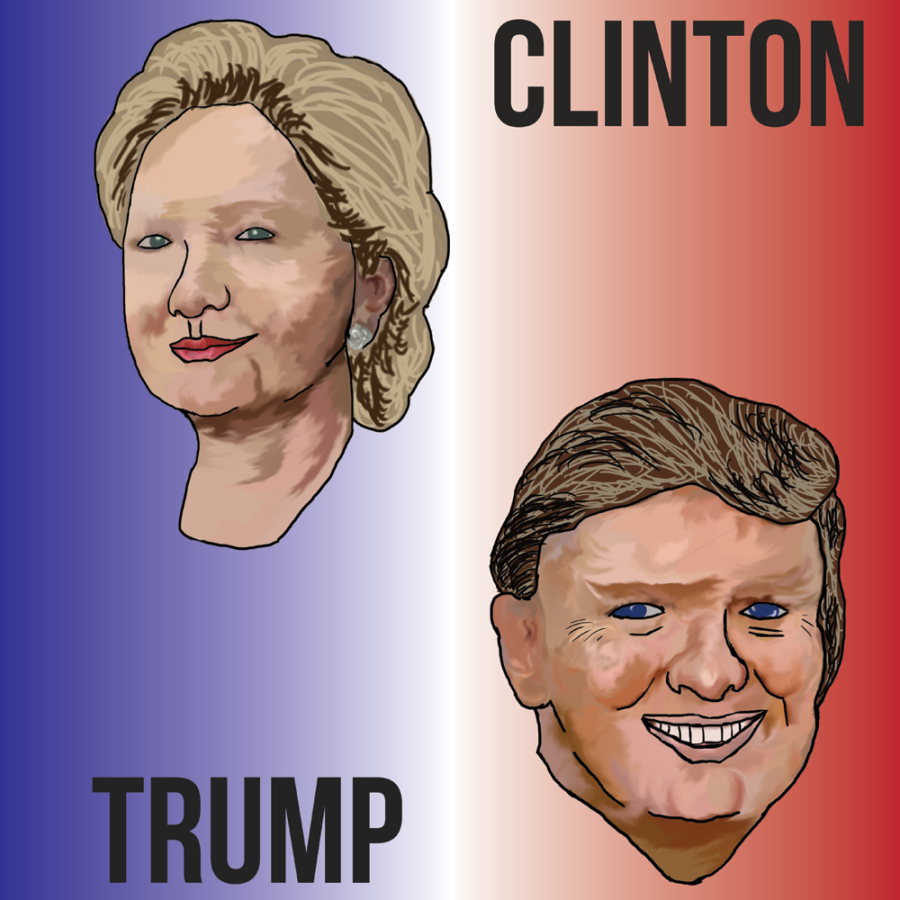Column: Trump-Clinton debate: Much ado but little impact?
Caricature of presidential candidates Hilary Clinton and Donald Trump. (Sloan Marion | DailyEgyptian.com)
September 26, 2016
WASHINGTON — Monday’s debate is the 56th anniversary of the television moment when John Kennedy and Richard Nixon met in the studios of WBBM in Chicago. For all the mythology surrounding Richard Nixon’s beard stubble during that first debate, far more debilitating was the vice president’s fatigue.
Like Hillary Clinton, the 47-year-old Nixon believed that he could power through any obstacle. Nixon had been hospitalized earlier in September for a serious knee infection — and, eager to make up for lost time, he campaigned through lunchtime on debate day.
Compounding his problems, the star-crossed Nixon badly banged his injured knee getting out of his limousine at WBBM. In “The Making of the President 1960,” Theodore White quotes an observer who said that Nixon’s face went all “white and pasty.”
Advertisement
Give Nixon a good night’s sleep and subtract the collision of his knee and the limo door — and the history of the 1960s might have been transformed.
As high-stakes news events, all the debates since 1960 have inculcated in the candidates a crippling fear of making a mistake.
The best illustration of the paralysis of overpreparation came in 1976 when the audio feed died toward the end of the first Gerald Ford-Jimmy Carter face-off. Since neither candidate had been briefed on how to react to unforeseen technical problems, both Ford and Carter stood at their lecterns like cigar-store Indians for 27 minutes, not daring to make a spontaneous move.
Of course, that caution failed to prevent Ford in the next debate from declaring that Poland wasn’t a Communist country. Ford then resisted grabbing the lifeline thrown by a debate moderator by refusing to abandon his head-scratching assertion that Poland wasn’t under Soviet domination.
Despite the journalistic game-change chorus, it is hard to find a single debate moment since Ford rhetorically liberated Poland that decided an election.
In fact, the best one-liners were politically irrelevant. Lloyd Bentsen’s “You’re no Jack Kennedy” putdown of Dan Quayle was in a vice presidential debate on behalf of a losing ticket.
Ronald Reagan would have romped home in a 1984 landslide even if he hadn’t said about Walter Mondale: “I will not make age an issue in this campaign. I am not going to exploit, for political purposes, my opponent’s youth and inexperience.”
Advertisement*
Political science research buttresses the theory that overhyped debate battles do not, in the end, move the numbers in a presidential race.
John Sides and Lynn Vavreck point out in “The Gamble,” their analytical look at the 2012 campaign, “One reason that presidential debates have not necessarily vaulted the underdog to victory is that a single debate victory has not been enough.”
In 2012, according to Sides and Vavreck, Barack Obama’s soporific performance in the first debate with Mitt Romney “helped rally Republicans who wavered after the release of the 47 percent video.” But then, the political scientists note, “later debates helped rally Democrats who wavered after Obama’s performance in the first debate.”
But all that assumes that both candidates are on equal footing. The closest parallel to the Clinton-Trump experiential mismatch is probably the 2008 vice presidential debate between Senate patriarch Joe Biden and freshly minted Alaska Gov. Sarah Palin.
Watching the beginning of that debate again for this column, I was struck that Palin seemed prepped enough to deliver a respectable performance in response to questions about the 2008 economic meltdown. Sure, Palin used trademark phrases like “you betcha” and invoked “hockey moms” but the mere act of putting her on the debate stage implied rough equality with Biden.
That may happen with Trump as well, assuming the bilious billionaire can control his volcanic temper, display such basic knowledge as knowing the names of the three branches of government and resist lying about statements that he made five minutes earlier in the debate.
Granted, it’s a tall order for Trump, especially the bit about not lying. But what Trump has going for him is the unavoidable reality that he is the nominee of the Republican Party and he is in striking distance in the polls. That creates a sense of parity even without diminished expectations from the voters.
All the glib talk about record TV audiences as high as 100 million viewers makes it easy to forget how influential the post-debate rinse-and-spin cycle can be. In 1976, after-analysis by newspapers and television stressed to voters how important Ford’s Polish misstep had been. Long before Rick Perry, The New York Times even ran an “Oops” headline: “Oops! Ford’s Gaffe, Carter’s ‘Cool’ Shift Momentum.”
Even if NBC’s Lester Holt practices potted-plant journalism and refuses to offer fact-checks to grotesque Trump misstatements, it is likely that social media, the crawl at the bottom of TV screens and subsequent news stories will offer more of a corrective than in the past.
The best advice for Clinton is to dare to be boring. The danger for her is to emulate Al Gore — another Democrat famed for his over-preparation — who seemed to adopt a different personality for each of his three 2000 debates with George W. Bush. Glib sound bites will not make Clinton charismatic, but confident policy discussions may make her seem comfortable with who she is.
One tip for viewers at home: As you watch, try to imagine how an undecided voter might react to 90 minutes of Trump and Clinton unplugged, free from teleprompters and the loud cheers of true believers. Or, failing that, just grit your teeth and mourn over how political rhetoric has declined since Lincoln and Douglas.
___
(c)2016 CQ-Roll Call, Inc., All Rights Reserved
Visit CQ Roll Call at www.rollcall.com
Distributed by Tribune Content Agency, LLC.
Advertisement








